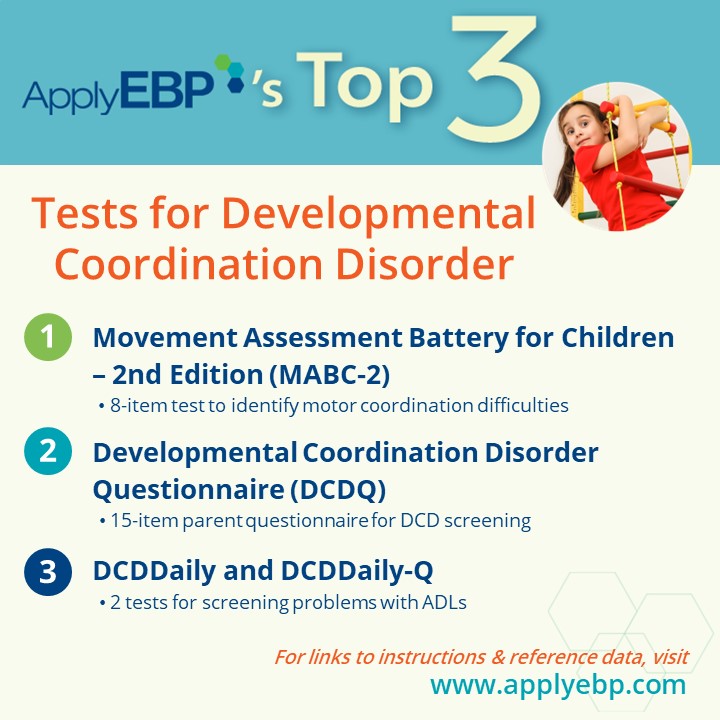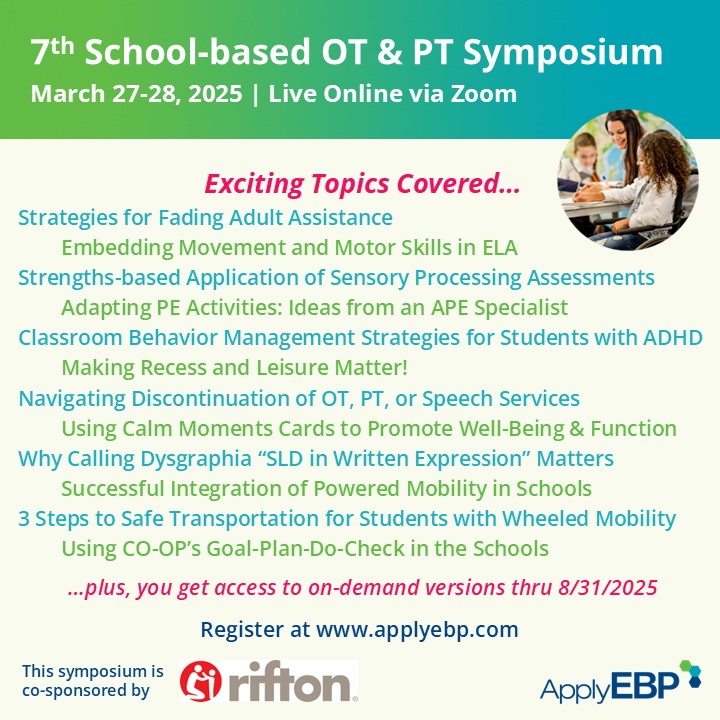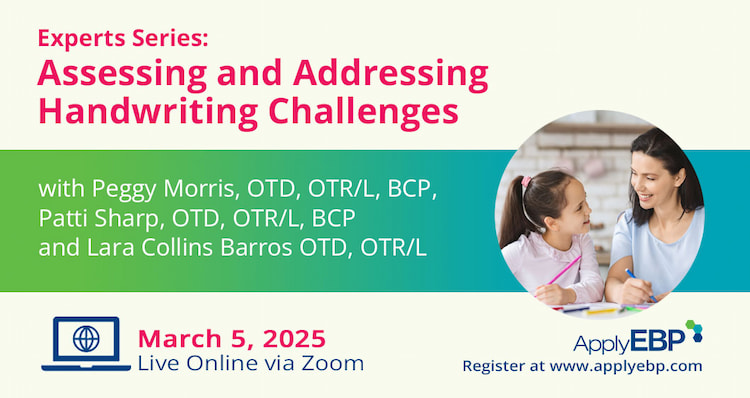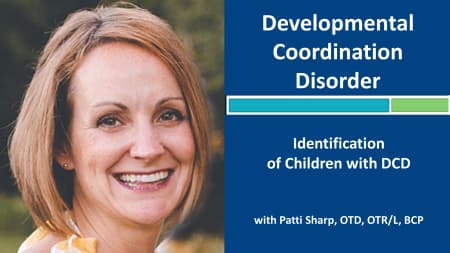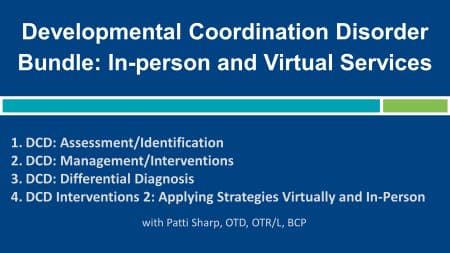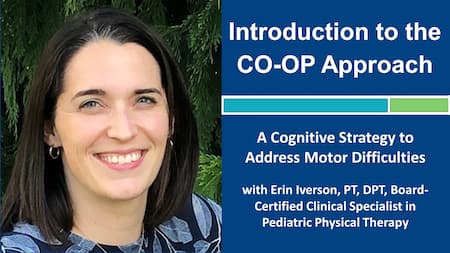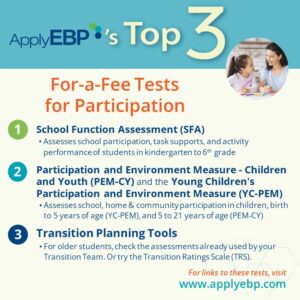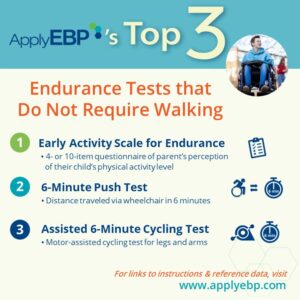Ask Apply EBP
Top 3 Tests for DCD
Note that this article is part of a series of articles on assessment. If you have not done so, first, read this articles:
-
-
-
- Must-Have Test and Organizing Your School-based Assessment – discusses the 5 critical reasons for assessing participation first
- 3 Principles for Selecting Tests – discusses the 3 principles to use when selecting tests at the activity and body function & structure levels
-
-
Q: What are the best tests for…DCD?
It is estimated that ~6% of school-aged children have Developmental Coordination Disorder (DCD) (Farmer et al, 2017). Knowing whether a child has or probably has DCD is very helpful in understanding the challenges of the child, and providing them with effective interventions targeted for DCD. For more information on the DSM-V criteria for DCD, read Erin Iverson’s article “Just Clumsy or Is it DCD?”
Here are our 3 favorite tests for DCD
1. Movement Assessment Battery for Children – 2nd Edition (MABC-2)
The Movement ABC-2 helps identify children with motor function impairment, 3 years to 16:11 years old. Its best use (as well as the BOT-2/3) is for children suspected of DCD, as research has shown that it is able to identify children with probable DCD.
-
-
- Test instruction: Purchase Movement ABC-2 here
- Equipment needed: Test kit includes all materials and forms needed
- Why we like this test:
- Scoring includes a traffic light system of red, amber, and green for easy interpretation.
- An alternative to the Movement ABC is the Bruininks Oseretsky Test. But we prefer the Movement ABC for its length, just 8 items versus the BOT’s 53 items.
- What to note:
- This test can satisfy the DSM-V’s “Criterion A for DCD: Learning and execution of coordinated motor skills is below expected level for age, given opportunity for skill learning.”
-
2. Developmental Coordination Disorder Questionnaire (DCDQ)
A 15-item parent questionnaire “to screen for coordination disorders in children age 5-15 years” (DCD website). The Litte DCDQ is also available for children 3-4 years of age.
-
-
- Test instruction: Administration Manual
- Where to get the questionnaire: Download DCDQ for free | Purchase Little DCDQ for CAD$50
- Equipment needed: none
- Why we like this test: Manual and Form includes cut-off scores for “indicated of, or suspect for DCD”.
- What to note: This test can satisfy the DSM-V’s “Criterion B for DCD: Motor skill difficulties significantly interfere with activities of daily living and impact academic/school productivity, prevocational and vocational activities, leisure and play.”
-
3. DCDDaily and DCDDaily-Q
These are 2 free tests of activities of daily living in children.
-
-
- Test: Download the tests forms and manuals here
- Equipment needed:
- The DCDDaily Manual includes all the materials that you would need to collect and those that you need to print to administer the test
- The DCDDaily-Q does not require testing materials; just the form
- Why we like this test:
- You can use either one. The DCDDaily is a test you administer to the child. While the DCDDaily-Q is a parent/caregiver questionnaire.
- There are cutoff scores to indicate problems with ADL.
- What to note: Just like the DCDQ above, these 2 tests can help satisfy Criterion B for DCD.
-
If you would like to learn more about evidence-informaed assessment and interventions, take…
References:
Blank, R. (2012). European Academy of Childhood Disability (EACD): Recommendations on the definition, diagnosis and intervention of developmental coordination disorder (pocket version). German-Swiss interdisciplinary clinical practice guideline S3-standard according to the Association of the Scientific Medical Societies in Germany. Pocket version. Definition, diagnosis, assessment, and intervention of developmental coordination disorder (DCD). Developmental medicine and child neurology, 54(11), e1-e7.
Dannemiller, L., Mueller, M., Leitner, A., Iverson, E., & Kaplan, S. L. (2020). Physical therapy management of children with developmental coordination disorder: an evidence-based clinical practice guideline from the Academy of Pediatric Physical Therapy of the American Physical Therapy Association. Pediatric physical therapy, 32(4), 278-313.
Farmer, M., Echenne, B., & Drouin, R. (2017). Insights in developmental coordination disorder. Current pediatric reviews, 13(2), 111-119.
Find More Answers to Your Questions in Our...
Featured School
Symposium
Featured Live
Workshop
Featured On-Demand
Webinar
Intro to the CO-OP Approach
Featured Webinar
Bundle
DCD Bundle: In-person & Virtual Services
Have a question?
Submit here…
*Clicking submit will send your question directly to our email inbox. Your name and email will let us know that your submission is real (not spam). We will not include these in our posts, unless you tell us to include your name. Please read our privacy policy here.
All infographics and videos on www.applyebp.com are intellectual properties of Apply EBP, LLC
You may use the infographics and videos for free for any non-commercial, educational purposes. Please cite the source as “Apply EBP, LLC” and a link to the source article. If you plan to use any infographic or video for commercial purposes (i.e., for profit), please email Carlo@applyebp.com to obtain a written permission. Permission can be granted on a case-by-case basis.

